 Petzlover
Petzlover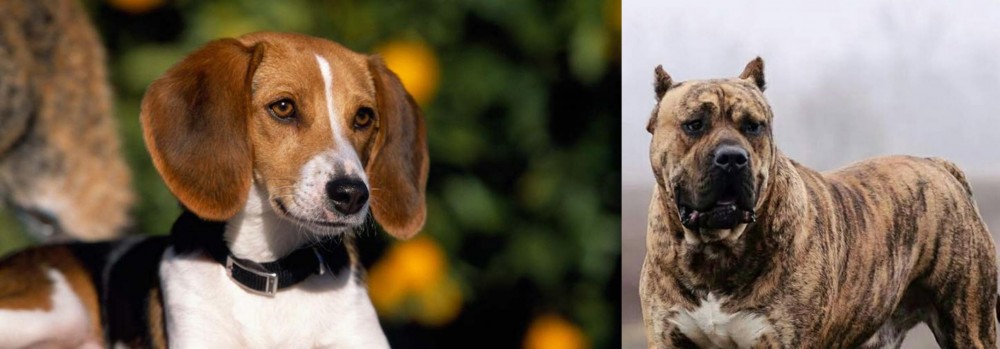 American Foxhound is originated from United States but Perro de Presa Canario is originated from Spain. Both American Foxhound and Perro de Presa Canario are having almost same height. American Foxhound may weigh 38 kg / 83 pounds lesser than Perro de Presa Canario. Both American Foxhound and Perro de Presa Canario has same life span. Both American Foxhound and Perro de Presa Canario has almost same litter size. Both American Foxhound and Perro de Presa Canario requires Low Maintenance.
American Foxhound is originated from United States but Perro de Presa Canario is originated from Spain. Both American Foxhound and Perro de Presa Canario are having almost same height. American Foxhound may weigh 38 kg / 83 pounds lesser than Perro de Presa Canario. Both American Foxhound and Perro de Presa Canario has same life span. Both American Foxhound and Perro de Presa Canario has almost same litter size. Both American Foxhound and Perro de Presa Canario requires Low Maintenance.
 As a cousin of the English Foxhound, the American Foxhound is a scent hound and bred for hunting. Robert Brooke brought the first hunting dogs to the colonies in 1650. These dogs were the starting point for several American hound breeds including the American Foxhound.
As a cousin of the English Foxhound, the American Foxhound is a scent hound and bred for hunting. Robert Brooke brought the first hunting dogs to the colonies in 1650. These dogs were the starting point for several American hound breeds including the American Foxhound.
For almost 300 years the Brooke family owned and bred dogs from this bloodline.
At the same time that Brooke was hunting with and breeding his hounds, George Washington was given French Foxhounds. These were crossed with the Brooke’s dogs to create the American Foxhound. This breed is said to have been originally bred in Virginia and Maryland.
They are the state dog of Virginia. After Red Foxes were imported or migrated, Irish Foxhounds were brought to American and added into the line, increasing the stamina and speed that today’s dog’s still display.
The American Foxhound was recognized by the American Kennel Club in 1886. Today’s American Foxhound presents in many different lines but are all considered the same breed even though some ay look very different. These strains include the Trigg, Walker, Penn-Marydel, Goodman, July and Calhoun.
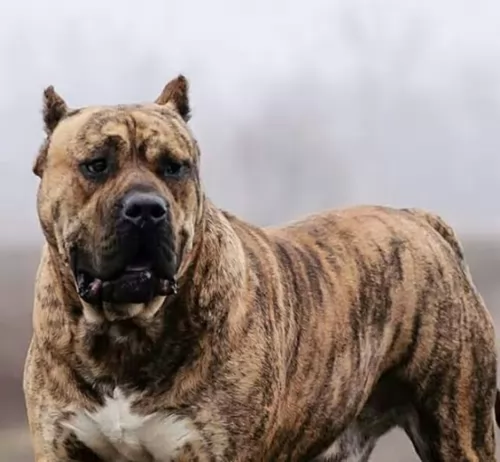 This large dog, also known as the Canary Mastiff, is a rare Molosser-type dog hailing from the Canary Islands.
This large dog, also known as the Canary Mastiff, is a rare Molosser-type dog hailing from the Canary Islands.
It does appear as if, according to records, that these dogs were also consumed at one time. The dog has also been used as a cattle dog as well as being used for dog fighting till the middle of the 1900s. Dog fighting was prohibited in the 1940s but it continued for a number of decades.
As people became interested in other dog breeds, the Presa nearly died out but some breeders revived the breed because of it having some good characteristics – territorial, brave, protective and intelligent. The FCI recognized the dog in 2011.
 Given the variety of bloodlines and strains mentioned above, there can be many differences in the American Foxhounds. Because of this most American Foxhounds bred to show are Walkers as they most closely fit the AKC Breed Standard.
Given the variety of bloodlines and strains mentioned above, there can be many differences in the American Foxhounds. Because of this most American Foxhounds bred to show are Walkers as they most closely fit the AKC Breed Standard.
In general, the American Foxhound has long, straight legs and is taller than the English Foxhound. They have a narrow chest and domed skull with a long muzzle.
They have low, wide set eyes that should be dark – brown or hazel, never blue. They have feet like a fox and laid-back shoulders with a curved tail. Athletic and muscled, the American Foxhound is bred to run. They are one of the rarest breeds in the United States.
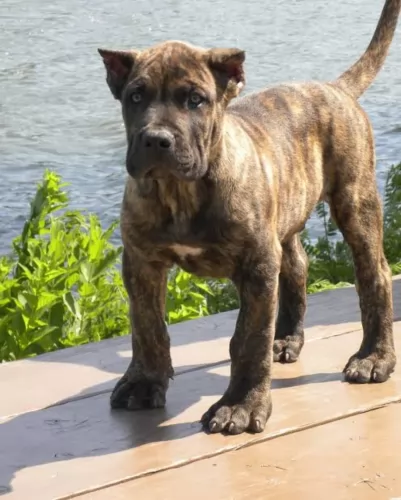 The Perro de Presa Canario or Canary Dog is large and muscular. He stands at 58 to 66cm in height and weighs anything from 40 – 70kg. He has a deep bark.
The Perro de Presa Canario or Canary Dog is large and muscular. He stands at 58 to 66cm in height and weighs anything from 40 – 70kg. He has a deep bark.
The head is broad and the ears are normally cropped to give him a more aggressive appearance. With ear cropping being banned the ears are close fitting to the head and are floppy. This is one of those dogs where the rear of the dog is slightly higher than the shoulders.
The coat is short and there is no undercoating. It is available in all different shades of fawn and brindle. The breed standard requires the dog having a black mask.
Canine experts tell us that this large working dog has got such fearless guardian characteristics that they wouldn’t recommend this dog for first time dog owners. On the other hand however, there are dog owners who claim that with good socialization, this dog becomes docile and amicable around their human family.
He is a clever dog so training and socialization will be easy and it will be worth it. This is a dog noted for its strength, it’s strong personality and potential for aggression, so training and socialization will be most important.
 With a reputation as a docile, sweet dog, the American Foxhound is great with kids and animals. They are gentle and often very shy with strangers. They are strong willed and stubborn especially when training them, so they are not a good first dog. They need an owner who has handled dogs before and knows how to be the pack leader without being angry or mean.
With a reputation as a docile, sweet dog, the American Foxhound is great with kids and animals. They are gentle and often very shy with strangers. They are strong willed and stubborn especially when training them, so they are not a good first dog. They need an owner who has handled dogs before and knows how to be the pack leader without being angry or mean.
The American Foxhound is a scent hound and once he is on the scent it is close to impossible to distract him from it. They have a tendency to ignore commands when they are in this state. A strong owner/leader is needed for this reason. Don’t let him off leash in an unfenced area.
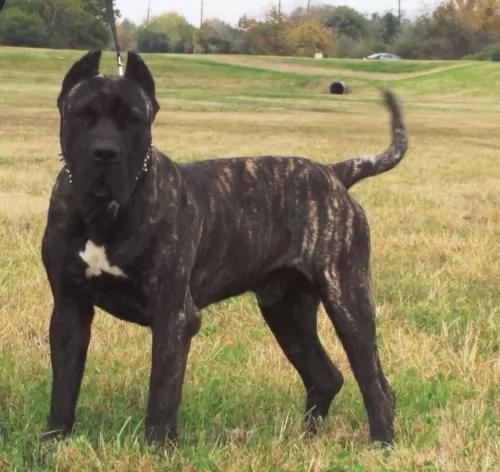 Contrary to what many people think, the Perro de Presa Canario can be a calm, gentle dog when trained and socialized properly.
Contrary to what many people think, the Perro de Presa Canario can be a calm, gentle dog when trained and socialized properly.
It is only when you bring an older, unknown dog into your midst that you would have to exercise caution with him as he can then be aggressive.
Dogs become dangerous and aggressive when they are brought up by aggressive, uncaring people. Humans are always to blame for the way a dog turns out. Provide this large dog with a loving, caring home, and he’ll show you what a remarkable pet he can be.
 The American Foxhound, like most hunting dogs does not carry a lot of genetic disorders. But they can easily become overweight and this can cause major problems. Dysplasia of any type had been mostly unknown in this breed, but due to obesity it is cropping up on occasion. Breeders have not, and do not usually screed for any genetic diseases.
The American Foxhound, like most hunting dogs does not carry a lot of genetic disorders. But they can easily become overweight and this can cause major problems. Dysplasia of any type had been mostly unknown in this breed, but due to obesity it is cropping up on occasion. Breeders have not, and do not usually screed for any genetic diseases.
The most devastating health issue the American Foxhound faces is thrombocytopathy. We will go into more detail on this in the Care for Pet section. This is a disease of the blood system, namely the platelets.
 The Perro de Presa Canario can live to be between 8 and 12 years of age. Being a large breed the dog can be susceptible to hip dysplasia and other problems such as cancer and heart problems. It is highly unlikely that a well cared for dog will get any of these illnesses.
The Perro de Presa Canario can live to be between 8 and 12 years of age. Being a large breed the dog can be susceptible to hip dysplasia and other problems such as cancer and heart problems. It is highly unlikely that a well cared for dog will get any of these illnesses.
It is far better to give your dog two smaller meals a day as opposed to one bigger meal as then he tends to wolf his food down. This can lead to bloat, where the stomach swells up and worse, it twists. This dangerous situation prevents fluid and air from escaping the stomach. Your dog is restless, he paces and salivates, wanting to vomit. Bloat can affect any dog at any age.
Kidney disease can develop because of some other illness or it can develop on its own. It can even be caused by bad teeth when bacteria enters the bloodstream of the dog.
 Whether feeding a pup, or an adult American Foxhound, you need to be sure the food is high quality and that you don’t overfeed. The Foxhound is happy to eat as much as you give him. They like to eat. Make sure you measure and don’t free feed. Control what they are eating.
Whether feeding a pup, or an adult American Foxhound, you need to be sure the food is high quality and that you don’t overfeed. The Foxhound is happy to eat as much as you give him. They like to eat. Make sure you measure and don’t free feed. Control what they are eating.
For a puppy feed twice, a day – 2 to 3 cups of high quality puppy food. When he becomes an adult feed him once a day with 2 cups of adult food.
As mentioned previously, the American English Foxhound, like most of the hound breeds is a very healthy dog. They do not have many genetic health issues. They do have a risk for thrombocytopathy. This risk is slight, but all owners of American English Foxhounds should be aware of it.
This disease is a circulatory system disease with poorly or non-functioning platelets. Platelets are designed to assist in the control of bleeding and without functioning ones the dog can bleed excessively from just a minor cut or bleed internally from a minor injury. The disease can be treated but you have to notice it first. Depending on how severe the disease is, the treatment will vary. Some dogs will have to be given platelets.
This is a high energy breed that is very active and needs a lot of exercise. They are not good for the first-time owner as they are stubborn and hard to train. They need room to run and get frustrated and out of sorts if they don’t have it. They can live in the suburbs but only with a large fenced yard, an even larger dog park and regular walks. This dog needs a lot of exercise. The simplest thing to do is take him hunting.
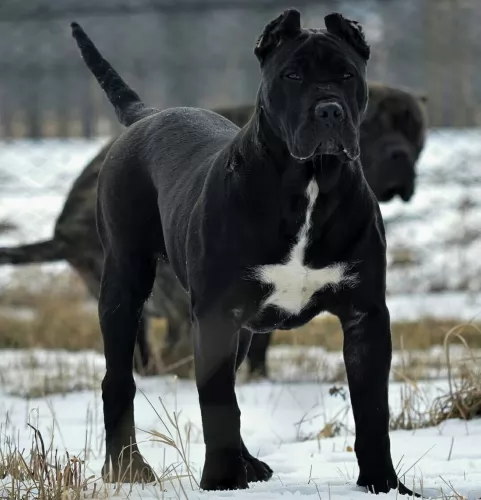 This is a short haired dog, and he isn't a heavy shedder so beyond regular twice-a-week brushing he will simply need to have his eyes and ears checked for infections.
This is a short haired dog, and he isn't a heavy shedder so beyond regular twice-a-week brushing he will simply need to have his eyes and ears checked for infections.
He will also need to have his nails clipped and to check his teeth over too. A sore, bad tooth at the back of your pet’s mouth can cause terrible pain but also play havoc with his general health.
Your Perro de Presa Canario is a high-energy dog and he will need daily exercise. He will love a good walk but he will also need something more strenuous and demanding such as ball- and rope tug-of-war games.
Try and provide your large pet with a top quality commercially manufactured food – one that is packed with vitamins and minerals instead of colorants preservatives and toxic fillers.
Break the monotony of feeding him only kibble by mixing in some cooked chicken, brown rice, sweet potato, carrots and spinach. Dogs love consistency and simplicity and simple meals like this with some raw meat thrown in occasionally will keep him healthy and happy. Never leave him without a constant supply of fresh, cool water.